Related Research Articles

Llanfairpwll railway station is a station on the North Wales Coast Line from Crewe to Holyhead, serving the village of Llanfairpwllgwyngyll, Anglesey.
Lieutenant-Colonel David Archibald Price-White, TD was a Welsh solicitor and Conservative Party politician. He served as the Member of Parliament (MP) for Caernarvon Boroughs from 1945 to 1950.

Nell Fidelia Mercer was an American suffragist. A member of the Silent Sentinels, she picketed Woodrow Wilson's White House in support of women's suffrage in the United States.

Llanfairpwllgwyngyll, or Llanfair Pwllgwyngyll, is a large village and local government community on the island of Anglesey, Wales, on the Menai Strait next to the Britannia Bridge and across the strait from Bangor. Both shortened and lengthened (Llanfairpwllgwyngyllgogerychwyrndrobwllllantysiliogogogoch) forms of the placename are used in various contexts.
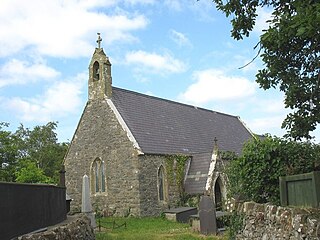
St Deiniol's Church, Llanddaniel Fab, is a small 19th-century parish church in the centre of Llanddaniel Fab, a village in Anglesey, north Wales. The first church in this location is said to have been established by St Deiniol Fab in 616. He was the son of St Deiniol, the first Bishop of Bangor. The current building, which is in Early English style, incorporates some material and fittings from an earlier church on the site, including the font and an 18th-century memorial in the porch. The vestry door has medieval jambs and the keystone of its arch, which is also medieval, is a carved human face. Some parts of the nave walls may also come from a previous building here.

Helena Charlotte Hill Weed was an American suffragist, and a member of the National Women's Party. She was one of the first American female geologists.

Women's suffrage was established in the United States on a full or partial basis by various towns, counties, states and territories during the latter decades of the 19th century and early part of the 20th century. As women received the right to vote in some places, they began running for public office and gaining positions as school board members, county clerks, state legislators, judges, and, in the case of Jeannette Rankin, as a member of Congress.
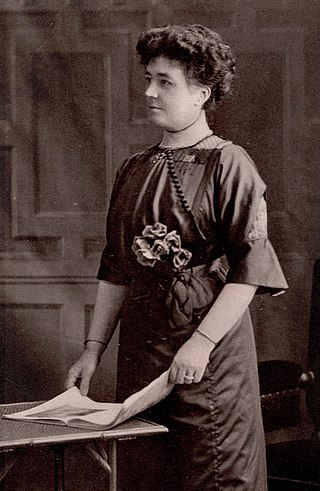
Edith Mansell-Moullin was an English suffragist of Welsh heritage and social activist. Proud of her Welsh roots, she founded the Cymric Suffrage Union, which was dedicated to gaining women's suffrage for Welsh women. She was the co-organizer of the Welsh contingent of the 1911 procession of the Women’s Suffrage Union’s "Great Demonstration" held in 1911 in London. Part of the more militant British suffrage contingent, she was imprisoned for dissidence and refused to stop government agitation during World War I.

Women's suffrage in Wales has historically been marginalised due to the prominence of societies and political groups in England which led the reform for women throughout the United Kingdom. Due to differing social structures and a heavily industrialised working-class society, the growth of a national movement in Wales grew but then stuttered in the late nineteenth century in comparison with that of England. Nevertheless, distinct Welsh groups and individuals rose to prominence and were vocal in the rise of suffrage in Wales and the rest of Great Britain.
Price White was a Welsh international footballer. He was part of the Wales national football team, playing one match on 29 February 1896 against Ireland.
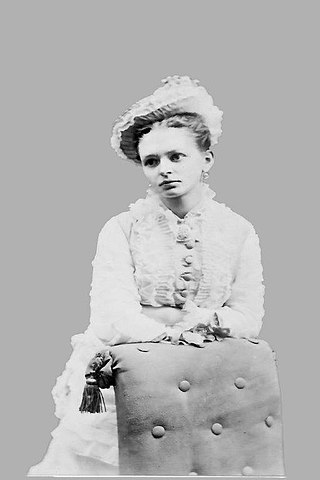
Alice Abadam was a Welsh suffragette, feminist and public speaker.

The Great Pilgrimage of 1913 was a march in Britain by suffragists campaigning non-violently for women's suffrage, organised by the National Union of Women's Suffrage Societies (NUWSS). Women marched to London from all around England and Wales and 50,000 attended a rally in Hyde Park.
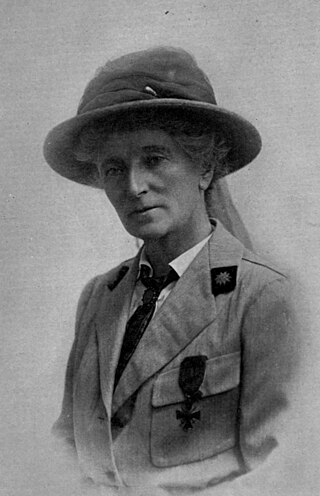
Katherine Mary Harley was a suffragist. In 1913 she proposed and organised the Great Pilgrimage on behalf of the National Union of Women's Suffrage Societies. During the First World War she helped to found and organise the Women's Emergency Corps.

Charlotte Ives Cobb Kirby was an influential and radical women's rights activist and temperance advocate in the state of Utah as well as a well-known national figure. Charlotte was born in Massachusetts and at six-years old moved to Utah with her mother as new members of the Church of Jesus Christ of Latter-day Saints, her mother later becoming Brigham Young's fifth plural wife. Charlotte, previously a plural wife herself, spoke out against polygamy and gained much opposition from polygamous women suffragists because of it. Her first marriage was to William S. Godbe, the leader of the Godbeite offshoot from the LDS Church. After divorcing Godbe, Kirby married John Kirby, a non-LDS man, and they were together until Charlotte's death in 1908. Charlotte was a leading figure of the Utah Territory Woman Suffrage Association, and served as a correspondent to the government and other suffragist organizations, including the National Women's Suffrage Association. Charlotte often traveled to the East Coast to deliver lectures regarding women's rights and temperance, the first Utah woman and the first woman with voting rights to speak to national suffragist audiences. Charlotte Ives Cobb Kirby died on January 24, 1908, at age 71 in Salt Lake City, Utah.
Helena Gertrude Jones was a British doctor and suffragette who campaigned for women's vote during the early twentieth century. Although sharing the platform with many notable suffragists, including Emmeline Pankhurst, she broke away from the Women's Social and Political Union, of whom she was a regional organiser, to challenge Pankhurst's decision to curtail the suffrage aims during the First World War.

Elizabeth "Lisbeth" Anne Maud McCracken, was a womens' suffragist and—under her maiden name L.A.M. Priestley—a feminist writer, active in the north of Ireland. Although unionist herself, with other members of the Belfast Irish Women's Suffrage Society she joined the Women's Social and Political Union in declaring a direct-action campaign against Ulster Unionists for their refusal in 1914 to honour a votes-for-women pledge. After the First World War and the achievement of the vote, she continued in what was now Northern Ireland to campaign on issues of domestic violence and sex discrimination.

Mary Eva Hastings Morris was a Welsh doctor and suffragist. Born in Dolgellau, she grew up in Malta, before returning to Wales to study medicine at the University College of Wales in Aberystwyth. She went on to become the first female doctor from Aberystwyth. After spells working at Great Ormond Street Children's Hospital in London, the North Devon Infirmary, and Bristol Royal Hospital for Sick Children and Women, Morris moved to Bath, where she worked as a medical inspector.

Women's suffrage in Pennsylvania was an outgrowth of the abolitionist movement in the state. Early women's suffrage advocates in Pennsylvania not only wanted equal suffrage for white women, but for all African Americans. The first women's rights convention in the state was organized by Quakers and held in Chester County in 1852. Philadelphia would host the fifth National Women's Rights Convention in 1854. Later years saw suffragists forming a statewide group, the Pennsylvania Woman Suffrage Association (PWSA) and other smaller groups throughout the state. Early efforts moved slowly, but steadily, with suffragists raising awareness and winning endorsements from labor unions.
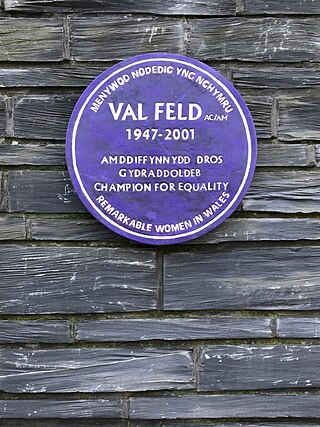
The Purple Plaques scheme in Wales, UK aims to install plaques on buildings to increase recognition of the lives of women who have had a significant and long-lasting impact associated with Wales.
References
- 1 2 3 4 "Former home of suffragist Charlotte Price White, Bangor". HistoryPoints. Retrieved 5 July 2021.
- 1 2 3 Baldwin, Anne; Robinson, Jane; Clarke, Lesley (2018). From Suffrage to Citizenship - celebrating 100 pioneers (PDF). Women's Local Government Society. Retrieved 5 July 2021.
- ↑ Evans, Neil (1 March 2017). "The Welsh women who took the long road to get the vote". WalesOnline. Retrieved 5 July 2017.
- ↑ "Home of Britain's first WI, Llanfairpwll". HistoryPoints. Retrieved 5 July 2021.
- 1 2 "Charlotte Price White (formerly Bell)". 100+MenywodCymreig - WelshWomen. Retrieved 5 July 2021.